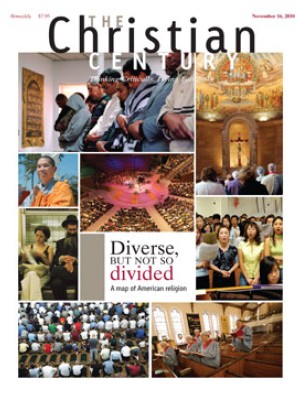Reactive mood
Congregations in crisis present a huge challenge to leaders, notes Peter Steinke, a veteran congregational consultant (see his article "Buckle up"). He emphasizes that change and the prospect of more change—even when it is planned—makes congregations anxious. Members can be expected to react out of emotion and fear. They will look for leaders to blame, and they will attach themselves to landmarks of what they imagine was a more glorious past.
Voters' mood in this recent election season had much in common with that of the anxious congregations Steinke describes. The reasons for that anxiety are real: high unemployment, a sluggish economy, home foreclosures and sagging home values, a sense of a diminished economic future. But as in Steinke's scenario, much of the political response to the crisis has been reactive, fearful and off the mark.
Read our latest issue or browse back issues.
Many voters, we were told, were recoiling against a dramatic expansion in federal government. They looked at the government bailouts of banks, Wall Street and the auto industry, at the $800 billion economic stimulus package and at new regulations for health care, and they decided that government spending was out of control and had done nothing for them. The extremists of the Tea Party held up the Constitution and contended that if we only returned to the small-government vision of the 18th century, we would find a path back to prosperity.
The truth is far different. The bailout of the banks forestalled a worldwide depression and in the end will cost the government little and may even turn a profit. Most economists think the stimulus package created or saved 3 million jobs and should, if anything, have been bigger. Reforming health care is necessary if there is to be any hope of managing health costs.
The glory of American politics is that voters get to "throw the rascals out"—whether or not they understand who the rascals are or the nature of the crisis the nation is in. Very little could have done by any government during this worldwide economic slowdown to address the high unemployment, except more government stimulus, which is what voters say they don't want.
The paradox of current politics is that voters like Democratic programs such as Medicare, Social Security, expanded health care and even environmental protection, but they also like the Republican strategy of low taxes and its rhetoric of smaller government.
What is most disturbing about this ideological standoff is that it makes it impossible to address many of the truly pressing issues facing government—such as how to pay for Medicare and Social Security, how to bring order and fairness to immigration law and how to counter climate change.
Perhaps, to learn from Steinke's reflections on leaders and congregations, our political task as leaders or simply as citizens is to maintain a nonanxious presence, to keep reminding our neighbors of troublesome truths, and to keep the conversation focused on the goals that, in the end, we may share.





